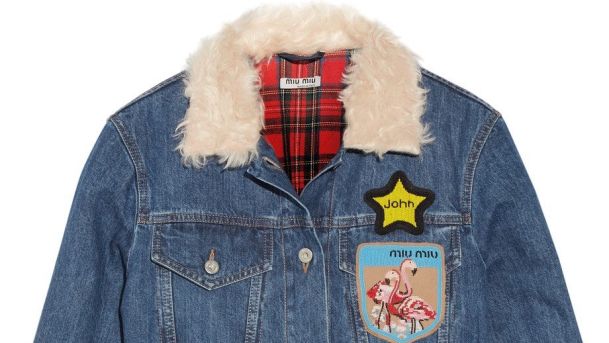
One of the offending Miu Miu garments
Fashion notoriously walks a fine line between edgy and absurd, and many times industry actors get it awfully wrong, whether it be editorials depicting abuse/violence against women, campaigns making light of race relations in order to promote a product or historically significant – and offensive – garments being trotted down the runway or being sold by mainstream retailers. The latest to run afoul of decency in the name of “fashion”? Miu Miu.
Miu Miu has confirmed on Thursday that it will pull all of the garments from its Fall/Winter 2017 collection that bear yellow star-shaped patches with men’s names, which some critics say resemble the Stars of David that Jews were forced to wear during the Holocaust. Prada’s little sister line came under fire this week when the World Jewish Congress, an international organization that advocates on behalf of Jewish communities and groups, shed light on its “discomfort over the items,” and demanded that Miu Miu pull the garments from its stock.
Preia Narendra, a spokeswoman for Miu Miu, apologized for “any offense” caused by the garments and stated that “it was not Miu Miu’s intent in any way to make any political or religious statement.” The World Jewish Congress has praised the label for taking quick action.
According to a statement from Robert Singer, the World Jewish Congress’ CEO and Executive Vice President, “The World Jewish Congress commends Miu Miu and its parent company, Prada, on its swift attention and action to the concerns we raised regarding the use of the yellow star on its clothing items. At this critical time, when anti-Semitism and bigotry are rearing their heads in the public sphere, we must continue to exercise caution and show sensitivity in every sphere and sector.”
Shockingly (or not), this is not the first instance of its kind. As noted by Newsweek, sportswear company Umbro came under fire in 2002 for its “Zyklon” trainer. “The company insisted the name of its shoe wasn’t chosen as a deliberate reference to the Holocaust, and it had apparently not been aware that the chemical Zyklon B was used to murder Nazi victims in extermination camps,” the publications further stated.
Urban Outfitters and Zara have been repeat offenders. In February 2015, the Anti-Defamation League sent a letter to the president and CEO of Philadelphia-based Urban Outfitters urging the company to remove a garment that looked a bit too much like the uniforms worn by gay male prisoners in Nazi concentration camps. As for Zara, the Spanish fast fashion giant apologized in 2014 for manufacturing and selling a children’s t-shirt that was slammed by the media for its similarity to the uniforms Jews wore in Nazi concentration camps.
As Newsweek pointed out, back in 2007, Zara was forced to withdraw a bag that bore a pattern incorporating green swastikas.
Such examples of consumer outrage-provoking by brands, despite the often intense wave of well, outrage, that comes along with them, have proven to be not as harmful in the long run for brands as one might expect. As we saw in connection with Pepsi’s undeniably tasteless commercial this spring starring Kendall Jenner, for which the company was met with so much pushback that it pulled the campaign, such product and/or ad campaign scandals tend to blow over.
The ones that tend to linger? Those involving the words of major fashion figures. Just ask Dolce & Gabbana co-founders Domenico Dolce and Stefano Gabbana or former Christian Dior creative director John Galliano.










